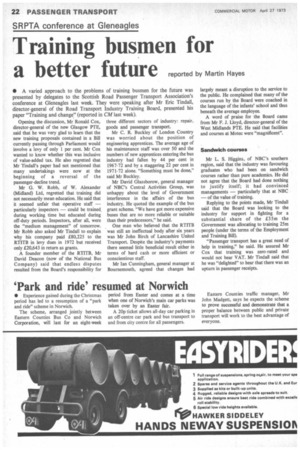SRPTA conference at Gleneagles
Page 24

If you've noticed an error in this article please click here to report it so we can fix it.
Training busmen for
a better future reported by Martin Hayes • A varied approach to the problems of training busmen for the future was presented by delegates to the Scottish Road Passenger Transport Association's conference at Gleneagles last week. They were speaking after Mr Eric Tindall, director-general of the Road Transport Industry Training Board, presented his paper "Training and change" (reported in CM last week).
Opening the discussion, Mr Ronald Cox, director-general of the new Glasgow PTE, said that he was very glad to learn that the new training proposals contained in a Bill currently passing through Parliament would involve a levy of only 1 per cent, Mr Cox wanted to know whether this was inclusive of value-added tax. He also regretted that Mr Tindall's paper had not mentioned that many undertakings were now at the beginning of a reversal of the passenger-decline trend.
Mr G. W. Robb, of W. Alexander (Midland) Ltd, regretted that training did not necessarily mean education. He said that it seemed unfair that operative staff — particularly inspectors — could be trained, during working time but educated during off-duty periods. Inspectors, after all, were the "medium management" of tomorrow. Mr Robb also asked Mr Tindall to explain why his company paid £80,225 to the RTITB in levy dues in 1972 but received only £20,643 in return as grants.
A founder member of the RTITB. Mr David Deacon (now of the National Bus Company) said that endless disputes resulted from the Board's responsibility for three different sectors of industry: repair, goods and passenger transport.
Mr C. R. Buckley of London Country was worried about the position of engineering apprentices. The average age of his maintenance staff was over 50 and the numbers of new apprentices entering the bus industry had fallen by 44 per cent in 1967-72 and by a staggering 22 per cent in 1971-72 alone. "Something must be done,said Mr Buckley.
Mr David Glassborow, general manager of NBC's Central Activities Group, was unhappy about the level of Government interference in the affairs of the bus industry. He quoted the example of the bus grant scheme. "We have got more expensive buses that are no more reliable or suitable than their predecessors," he said.
One man who believed that the RTITB was still an ineffectual body after six years was Mr John Birch of Lancashire United Transport. Despite the industry's payments there seemed little beneficial result either in terms of hard cash or more efficient or conscientious staff.
Mr Ian Cunningham, general manager at Bournemouth, agreed that changes had largely meant a disruption to the service to the public. He complained that many of the courses run by the Board were coached in the language of the infants' school and thus beneath the average employee.
A word of praise for the Board came from Mr F. J. Lloyd, director-general of the West Midlands PTE. He said that facilities and courses at Motec were "magnificent".
Sandwich courses Mr L. S. Higgins, of NBC's southern region, said that the industry was favouring graduates who had been on sandwich courses rather than pure academics. He did not agree that the Board had done nothing to justify itself; it had convinced managements — particularly that at NBC — of the value of training.
Replying to the points made, Mr Tindall said that the Board was looking to the industry for support in fighting for a substantial share of the £35m the Government was allocating to training 25m people (under the terms of the Employment and Training Bill).
"Passenger transport has a great need of help in training," he said. He assured Mr Cox that training was zero-rated and would not bear VAT. Mr Tindall said that he was "delighted" to hear that there was an upturn in passenger receipts.












































































































